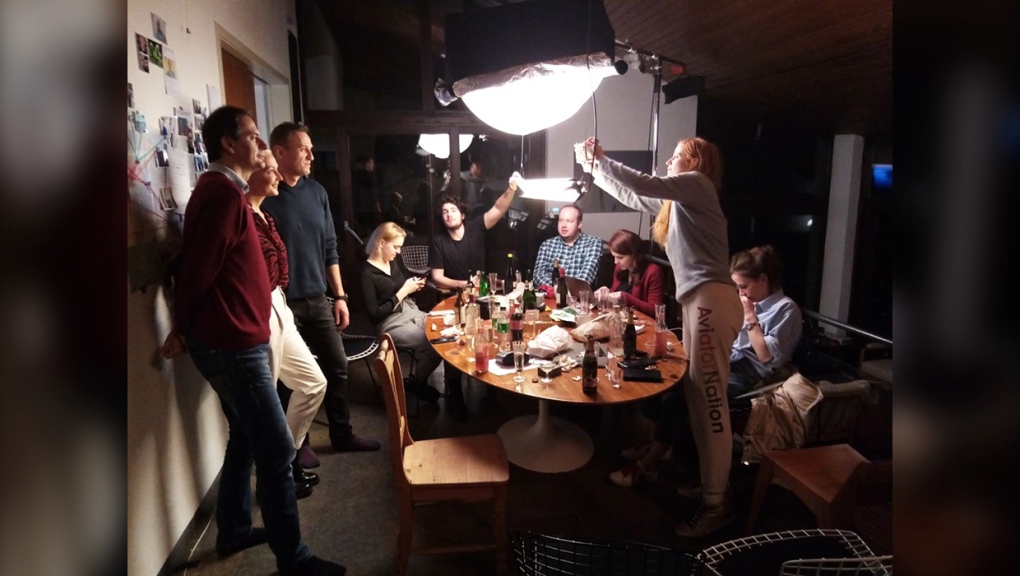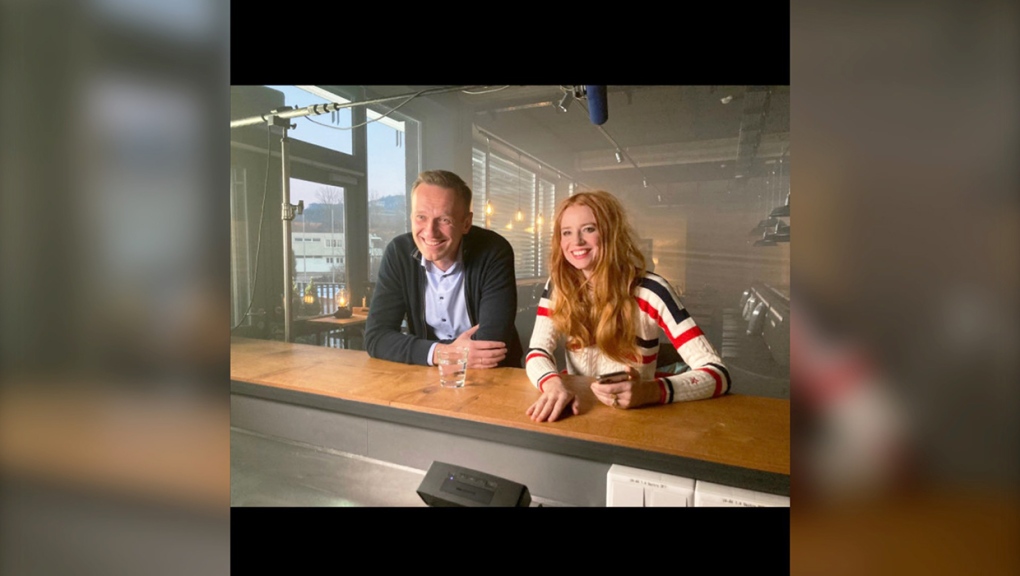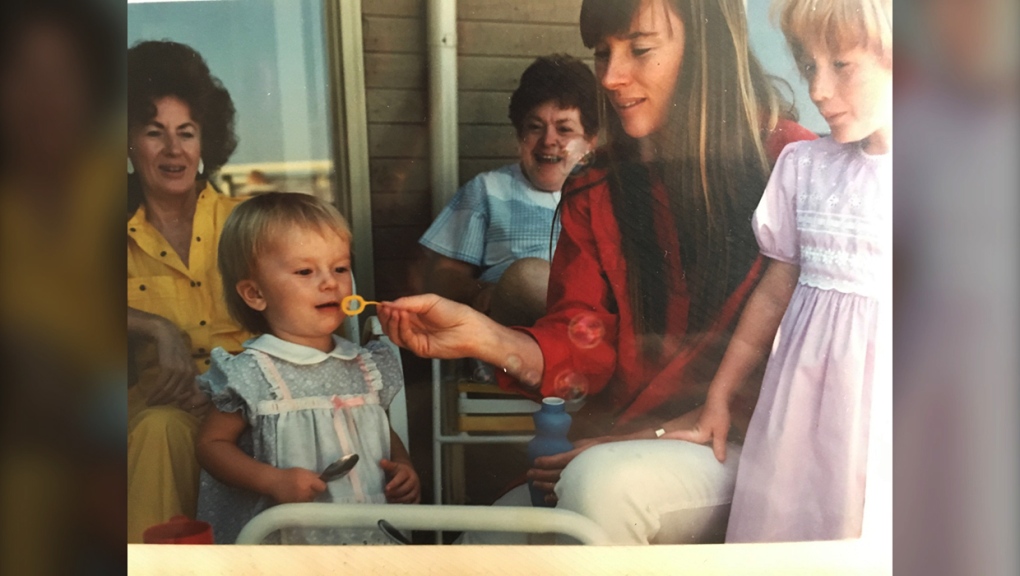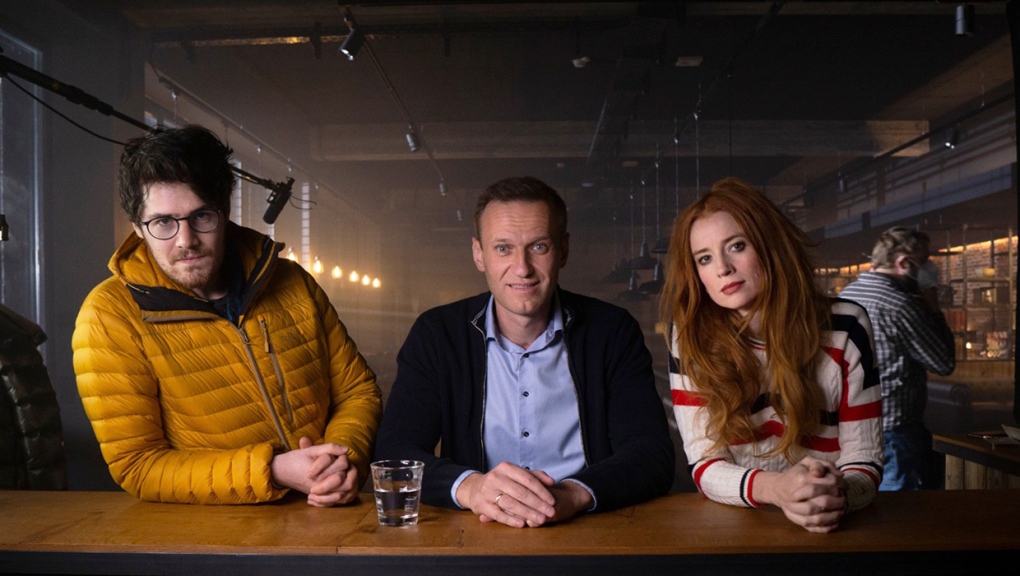'Their eyes were burning': Former Calgarian producer Odessa Rae heads for Oscars Sunday for Navalny
 Bulgarian journalist Christo Grozev, former Calgarian Odessa Rae and Alexei Navalny worked with Toronto director Daniel Roher and others to create Navalny, an Oscar nominee for Best Documentary Feature Film (Photo courtesy Odessa Rae)
Bulgarian journalist Christo Grozev, former Calgarian Odessa Rae and Alexei Navalny worked with Toronto director Daniel Roher and others to create Navalny, an Oscar nominee for Best Documentary Feature Film (Photo courtesy Odessa Rae)
EDITOR'S NOTE: Last year, CTV News spoke to documentary film producer Odessa Rae about growing up in Calgary and how she came to produce the Oscar-winning documentary about the Russian opposition leader, who died Friday in a Russian prison. Here's a look back at Rae's experience sharing the story of Navalny with the world.
A former Calgarian is up for an Oscar Sunday night at the Academy Awards.
Odessa Rae is one of the producers of Navalny, the documentary about Alexy Navalny, the man many believe poses the greatest political threat to Vladimir Putin.
It's up for Best Documentary Feature Film Sunday night and after winning the BAFTA – the British Oscar – in the same category, has to be considered a leading candidate.
Rae spoke to CTV News last weekend about the experience of shooting the film in the Black Forest of Bavaria, where Navalny recuperated during the pandemic after Putin enlisted some people to poison him on a flight one day.
UKRAINE, 2020
The film was directed by Toronto's Daniel Roher (Once Were Brothers), who Rae found herself with in Ukraine in the autumn of 2020, trying to put together a documentary film about the Ukrainian pursuit of some members of the Wagner Group, Putin's mercenaries.
It wasn't going very well.
The duo were working with a Bulgarian investigative journalist named Christo Grozev, who told them, one day, on a flight from Kyiv to Vienna, where Christo was based, that he had a lead on the identities of who had poisoned Navalny.
"We were both like, 'Do you know him?'" Rae said. "Because obviously it was a very big story at the time.
 The crew of Navalny (Photo courtesy Odessa Rae)
The crew of Navalny (Photo courtesy Odessa Rae)
"And Christo was like, I don't really but we follow each other on Twitter and he knows who I am so I'm going to have to reach out to tell him I have lead into who poisoned him."
That led to them enquiring into whether someone was doing a documentary about Navalny's journey.
Someone had to be, they thought. It's too good a story.
- Kremlin foe's team confirms his death, says his mother is searching for his body
"There was actually no one filming with him," Rae said. "And it was COVID, so it was difficult for people to go and meet with him. And we were (already) in Vienna, because of filming this other (Wagner) thing, and at that time, he had been moved (to a small motel in the Black Forest).
Grozev reached out on Twitter and he heard back. The next thing Rae knew, Roher and Grozev were driving into the Black Forest, to pitch Navalny on doing a documentary about his quest to become the Russian president.
After a few weeks of radio silence, the word came back from the Navalny camp: they were welcome to document Navalny's recovery and would receive full access to him.
 Odessa Rae and Navalny director Daniel Roher
Odessa Rae and Navalny director Daniel Roher
THE COLD CALL SEQUENCE
That led to an extraordinary sequence in the film that was one-part Borat mockumentary and one part James Bond: Navalny on camera one morning, cold calling members of the kill team assigned to kill him.
"I think Navalny actually came up with that on the very first day we met him," Rae says. "We arrived and had all this data we wanted to show Navalny, and so Navalny was looking at these possible identities of this kill team and thought, 'Gosh, if we're going to publish their names, why don't I just give them a call on the morning before publication and be like, hey, it's Navalny, why did you try and kill me?"
One by one, Navalny calls his would-be assassins, who are professionally trained not to talk on anything but a secure line, and one by one they refused to speak to him – which is about how Rae figured it would go.
"That would be a good little set piece – and we really thought it would amount (to nothing more)."
 Navalny and Odessa Rae during the shooting of Navalny (Photo courtesy Odessa Rae)
Navalny and Odessa Rae during the shooting of Navalny (Photo courtesy Odessa Rae)
But Grozev, who writes for a Netherlands-based investigative journalism website called Bellingcat, rigged the phone Navalny was using so that it appeared to be coming from FSB headquarters.
After a number of hang ups, Navalny starts talking to someone but there's no hang up. He's speaking in Russian, so neither Rae nor Roher could understand any of it, but from the looks on the face of Grozev and others in the crew, she could tell something extraordinary was taking place – and it was.
The spy confessed to the whole thing and Roher's cameras captured all of it on film – which turned the entire experience into a little more of a James Bond movie than Rae wanted it to be.
"This was probably one of the scariest moments of the whole shoot, because we thought God, if the FSB are actually doing their job, they're probably watching him," she said. "And listening to him, and they could break down that door right now, and kill us all for that footage, because we thought – this phone call could take down the Russian government.
"It was just that insane," she added. "That this guy had just basically divulged, had confessed, to the planning and the execution of the poisoning of a Russian citizen – by the government.
"We were just running around like crazy.'Upload the footage!' 'Call the police' Call for backup!
"That was the day David and I looked at each other and thought, we have a movie. We have a crazy movie!"
All of that was shot on camera equipment rented by Rae, who put it on her credit card, before any funding had been secured. The film was eventually financed by CNN Films and HBO Max, among others.
"You know, the spirit of documentary filmmaking," she says. "You think you have a great lead and you just have to jump in with both feet – it's usually you bearing the cost at the beginning of the journey – whatever exploration you do, at the time, Daniel and I were not famous filmmakers – but we believed in this possible story we were going to, and just decided to take the risk."
CALGARY YEARS
Rae was born in Calgary, but moved to India, with her mother and father when she was an infant.
The family moved back to Calgary when she was eight and she lived in the city until she was 13, where she was partly raised by her grandparents when her parents' marriage broke up.
"My grandfather and grandmother, they're both very old Calgarians," she says. "My grandfather started a company called Great West Kenworth and my aunts and uncles – I have many aunts and uncles in Calgary, my entire mother's side of the family are all still there and we still spend holidays and Christmas there. I think I have about 17 cousins in Calgary.
 Navalny producer Odessa Rae was born in Calgary, and lived there between the age of 8 and 13 (Photo courtesy Odessa Rae)
Navalny producer Odessa Rae was born in Calgary, and lived there between the age of 8 and 13 (Photo courtesy Odessa Rae)
"Calgary is a huge part of my family and my life and my upbringing," she said. "My mother went back to University of Calgary when we came back from India – it's been wonderful to watch that city grow and evolve.
"It has a very special place in my heart."
Rae is an actress (Smallville, Hard Candy, Leverage, and A Dog's Christmas Miracle, among many others) who studied international relations at the University of Toronto, speaks Japanese and was involved with the creation of Ivanhoe Pictures, which produced Crazy Rich Asians.
She executive produced a film called Of Dust and Bones and had a role in a rom-com directed by Heather Graham called Half Magic.
Before Navalny, she produced the documentary The Story Won't Die, about a group of Syrian artists continuing to make art during that country's civil war. It aired on Apple and Amazon Prime in 2022.
A LITTLE MORE THAN A HIT MOVIE
Navalny has become a hit in Hollywood, but given where the world is at with the invasion of Ukraine, it feels like a little more than that.
It feels like a film that might change history. Navalny recovered from being poisoned – and returned to Russia, despite being fully aware that Putin is trying to kill him. He's currently in prison, in poor health.
The night Navalny won the BAFTA for Best Documentary, Navalny went on Twitter where he recounted meeting Roher and Rae - all while admitting he hasn't yet been able to see the film.
"I think back to the day I met this weird couple," he wrote. "The Canadian director, who had his camera wrapped in duct tape, and his redheaded producer, who knew Japanese - and I think about how great it was that I agreed to do this film quite unexpectedly for myself."
"Their eyes were burning and I thought it would be nice to work with people with burning eyes."
Meanwhile Grozev, the Bulgarian journalist, landed on Russia's Most Wanted list in December, just before the Oscar nominations were announced.
Is Alexy Navalny the way out of the war in Ukraine?
"It's a very humbling thought but I think people change history," Rae says. "We just capture one person who is incredibly brave and an example for all of us to watch and learn from.
"Navalny is someone who just reminds us to be that. To not be afraid."
 Daniel Roher, Alexy Navalny, and Odessa Rae (Photo courtesy Odessa Rae)
Daniel Roher, Alexy Navalny, and Odessa Rae (Photo courtesy Odessa Rae)
CTVNews.ca Top Stories

Teenage phenom Gavin McKenna scores, Canada tops Finland 4-0 in world junior opener
Teenage sensation Gavin McKenna scored late in the first period and Carter George made 31 saves for the shutout as Canada picked up a 4-0 victory over Finland in the host country's opener at the world junior hockey championship Thursday.
Ministers Joly, LeBlanc travel to Florida to meet with Trump's team
Two members of Prime Minister Justin Trudeau's cabinet will be in Palm Beach, Fla., Friday to meet with members of Donald Trump's team.
Hwy. 401 off-ramp shut down due to Boxing Day deal-hunters now reopen
A Highway 401 off-ramp west of Toronto that became so clogged up with Boxing Day deal-hunters Thursday that police had to shut it down out of safety concerns has re-opened.
India alleges widespread trafficking of international students through Canada to U.S.
Indian law enforcement agencies say they are investigating alleged links between dozens of colleges in Canada and two 'entities' in Mumbai accused of illegally ferrying students across the Canada-United States border.
Teen actor Hudson Meek, who appeared in 'Baby Driver,' dies after falling from moving vehicle
Hudson Meek, the 16-year-old actor who appeared in 'Baby Driver,' died last week after falling from a moving vehicle in Vestavia Hills, Alabama, according to CNN affiliate WVTM.
B.C woman awarded nearly $750K in court case against contractor
A B.C. woman has been awarded nearly $750,000 in damages in a dispute with a contractor who strung her along for a year and a half and failed to complete a renovation, according to a recent court decision.
Florida pizza deliverer charged with stabbing pregnant woman after tip dispute
A pizza deliverer in central Florida has been charged with pushing her way into a motel room with an accomplice and stabbing a pregnant woman after a dispute over a tip, authorities said.
2 minors, 2 adults critically injured in south Calgary crash; incident was preceded by a robbery
Multiple people were rushed to hospital, including two minors, in the aftermath of a serious vehicle collision on Thursday morning.
Christmas Eve stowaway caught on Delta airplane at Seattle airport
A stowaway was caught trying to nab a ride on a Delta Air Lines plane at Seattle-Tacoma International Airport on Christmas Eve.
































